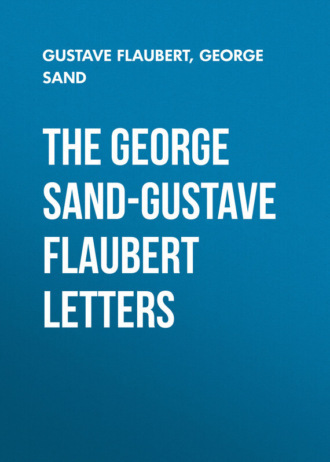 полная версия
полная версияThe George Sand-Gustave Flaubert Letters
Oh! no! not so humble! our ambition is higher, and our courtesy greater. – When one thinks highly of one's mind one does not choose the necessary means to please the crowd. You understand me, don't you?
But enough of this. I shall come to see you one of these days. Looking forward to that with pleasure, dear madame, I kiss your hands and am entirely yours,
Gustave Flaubert
Sunday evening.
CLVIII. TO GEORGE SAND
March, 1870
Dear master,
I have just sent your letter (for which I thank you) to Madame Cornu, enclosing it in a letter from your troubadour, in which I permitted myself to give bluntly my conception of things.
The two letters will be placed under the eyes of the LADY and will teach her a little about aesthetics.
I saw l'Autre last evening, and I wept several times. It did me good, really! How tender and exalting it is! What a charming work and how they love the author! I missed you. I wanted to give you a kiss like a little child. My oppressed heart is easier, thank you. I think that it will get better! There were a lot of people there. Berton and his son were recalled twice.
CLIX. TO GUSTAVE FLAUBERT
Nohant, 3 April, 1870
Your old troubadour has passed through cruel anguish, Maurice has been seriously, dangerously ill.[Footnote: With diptheria.] Favre, MY OWN doctor, the only one in whom I have confidence, hastened to us in time. After that Lolo had violent attacks of fever, other terrors! At last our savior went off this morning leaving us almost tranquil and our invalids went out to walk in the garden for the first time. – But they still want a great deal of care and oversight, and I shall not leave them for two or three weeks. If then you are awaiting me in Paris, and the sun calls you elsewhere, have no regret about it. I shall try to go to see you in Croisset from Paris between the dawn and the dusk sometime.
At least tell me how you are, what you are doing, if you are on your feet in every way.
My invalids and my well ones send you their affectionate regards, and I kiss you as I love you; it is not little.
G. Sand
My friend Favre has quite a FANCY for you and wants to know you. He is not a physician who seeks practice, he only practices for his friends, and he is offended if they want to pay him. YOUR PERSONALITY interests him, that is all, and I have promised to present him to you, if you are willing. He is something more than a physician, I don't know what exactly, A SEEKER – after what? – EVERYTHING. He is amusing, original and interesting to the utmost degree. You must tell me if you want to see him, otherwise I shall manage for him not to think of it any more. Answer about this matter.
CLX. TO GEORGE SAND
Monday morning, 11 o'clock
I felt that something unpleasant had happened to you, because I had just written to you for news when your letter was brought to me this morning. I fished mine back from the porter; here is a second one.
Poor dear master! How uneasy you must have been and Madame Maurice also. You do not tell me what he had (Maurice). In a few days before the end of the week, write to confirm to me that everything has turned out well. The trouble lies, I think, with the abominable winter from which we are emerging! One hears of nothing but illnesses and funerals! My poor servant is still at the Dubois hospital, and I am distressed when I go to see him. For two months now he has been confined to his bed suffering horribly.
As for me, I am better. I have read prodigiously. I have overworked, but now I am almost on my feet again. The mass of gloom that I have in the depths of my heart is a little larger, that is all. But, in a little while, I hope that it will not be noticed. I spend my days in the library of the Institute. The Arsenal library lends me books that I read in the evening, and I begin again the next day. I shall return home to Croisset the first of May. But I shall see you before then. Everything will get right again with the sun.
The lovely lady in question made to me, for you, the most proper excuses, asserting to me that "she never had any intention of insulting genius."
Certainly, I shall be glad to meet M. Favre; since he is a friend of yours I shall like him.
CLXI. TO GEORGE SAND
Tuesday morning
Dear master,
It is not staying in Paris that wears me out, but the series of misfortunes that I have had during the last eight months! I am not working too much, for what would become of me without work? However, it is very hard for me to be reasonable. I am overwhelmed by a black melancholy, which returns a propos of everything and nothing, many times a day. Then, it passes and it begins again. Perhaps it is because it is too long since I have written anything. Nervous reservoirs are exhausted. As soon as I am at Croisset, I shall begin the article about my poor Bouilhet, a painful and sad task which I am in a hurry to finish, so as to set to work at Saint- Antoine. As that is an extravagant subject, I hope it will divert me.
I have seen your physician, M. Favre, who seemed to me very strange and a little mad, between ourselves. He ought to like me for I let him talk all the time. There are high lights in his talk, things which sparkle for a moment, then one sees not a ray.
CLXII. TO GEORGE SAND
Paris, Thursday
M. X. – sent me news of you on Saturday: so now I know that everything is going well with you, and that you have no more uneasiness, dear master. But you, personally, how are you? The two weeks are almost up, and I do not see you coming.
My mood continues not to be sportive. I am still given up to abominable readings, but it is time that I stopped for I am beginning to be disgusted with my subject.
Are you reading Taine's powerful book? I have gobbled it down, the first volume with infinite pleasure. In fifty years perhaps that will be the philosophy that will be taught in the colleges.
And the preface to the Idees de M. Aubray?
How I long to see you and to jabber with you!
CLXIII. TO GUSTAVE FLAUBERT
Nohant, 16 April, 1870
What ought I to say to Levy so that he will take the first steps? Tell me again how things are, for my memory is poor. You had sold him one volume for ten thousand; – there are two, he himself told me that that would be twenty thousand. What has he paid you up to now? What words did you exchange at the time of this payment?
Answer, and I act.
Things are going better and better here, the little ones well again, Maurice recovering nicely, I tired from having watched so much and from watching yet, for he has to drink and wash out his mouth during the night, and I am the only one in the house who has the faculty of keeping awake. But I am not ill, and I work a little now and then while loafing about. As soon as I can leave, I shall go to Paris. If you are still there, it will be A PIECE OF GOOD LUCK, but I do not dare to wish you to prolong your slavery there, for I can see that you are still ill and that you are working too hard.
Croisset will cure you if you consent to take care of yourself.
I embrace you tenderly for myself and for all the family which adores you.
G. Sand
CLXIV. TO GUSTAVE FLAUBERT, at Croisset
Nohant, 20 May, 1870
It is a very long time since I have had news of my old troubadour. You must be in Croisset. If it is as warm there as it is here, you must be suffering; here it is 34 degrees in the shade, and in the night, 24. Maurice has had a bad relapse of sore throat, without membranes this time, and without danger. But the inflammation was so bad that for three days he could hardly swallow even a little water and wine. Bouillon did not go down. At last this excessive heat has cured him, it suits us all here, for Lina went to Paris this morning vigorous and strong. Maurice gardens all day. The children are gay and get prettier while you look at them. As for me, I am not accomplishing anything; I have too much to do taking care of and watching my boy, and now that the little mother is away, the little children absorb me. I work, however, planning and dreaming. That will be so much done when I can scribble.
I am still ON MY FEET, as Doctor Favre says. No old age yet, or rather normal old age, the calmness … OF VIRTUE, that thing that people ridicule, and that I mention in mockery, but that corresponds by an emphatic and silly word, to a condition of forced inoffensiveness, without merit in consequence, but agreeable and good to experience. It is a question of rendering it useful to art when one believes in that, to the family and to friendship when one cares for that; I don't dare to say how very simple and primitive I am in this respect. It is the fashion to ridicule it, but let them. I do not want to change.
There is my SPRING examination of my conscience, so as not to think all summer about anything except what is not myself.
Come, you, your health first? And this sadness, this discontent that Paris has left with you, is it forgotten? Are there no longer any painful external circumstances? You have been too much shaken also. Two of your dearest friends gone one after the other. There are periods in life when destiny is ferocious to us. You are too young to concentrate on the idea of REGAINING your affections in a better world, or in this world made better. So you must, at your age (and at mine I still try to), become more attached to what remains. You wrote that to me when I lost Rollinat, my double in this life, the veritable friend whose feeling for the differences between the sexes had never hurt our pure affection, even when we were young. He was my Bouilhet and more than that; for to my heart's intimacy was joined a religious reverence for a real type of moral courage, which had undergone all trials with a sublime SWEETNESS. I have OWED him everything that is good in me, I am trying to keep it for love of him. Is there not a heritage that our beloved dead leave us?
The despair that would make us abandon ourselves would be a treason to them and an ingratitude. Tell me that you are calm and soothed, that you are not working too much and that you are working well. I am not without some anxiety because I have not had a letter from you for a long time. I did not want to ask for one till I could tell you that Maurice was quite well again; he embraces you, and the children do not forget you. As for me, I love you.
G. Sand
CLXV. TO GEORGE SAND
No, dear master! I am not ill, but I have been busy with moving from Paris and with getting settled in Croisset. Then my mother has been very much indisposed. She is well now; then I have had to set in order the rest of my poor Bouilhet's papers, on whom I have begun the article. I wrote this week nearly six pages, which was very good for me; this work is very painful in every way. The difficulty is in knowing what not to say. I shall console myself a little in blurting out two or three dogmatic opinions on the art of writing. It will be an opportunity to express what I think; a sweet thing and one I am always deprived of.
You say very lovely and also good things to me to restore my courage. I have hardly any, but I am acting as if I had, which perhaps comes to the same thing.
I feel no longer the need of writing, for I used to write especially for one person alone, who is no more. That is the truth! And yet I shall continue to write. But I have no more liking for it; the fascination is gone. There are so few people who like what I like, who are anxious about what I am interested in! Do you know in this Paris, which is so large, one SINGLE house where they talk about literature? And when it happens to be touched on incidentally, it is always on its subordinate and external sides, such as the question of success, of morality, of utility, of its timeliness, etc. It seems to me that I am becoming a fossil, a being unrelated to the surrounding world.
I would not ask anything better than to cast myself on some new affection. But how? Almost all my old friends are married officials, thinking of their little business the entire year, of the hunt during vacation and of whist after dinner. I don't know one of them who would be capable of passing an afternoon with me reading a poet. They have their business; I, I have none. Observe that I am in the same social position that I was at eighteen. My niece whom I love as my daughter, does not live with me, and my poor good simple mother has become so old that all conversation with her (except about her health) is impossible. All that makes an existence which is not diverting.
As for the ladies, "my little locality" furnishes none of them, and then, – even so! I have nevver been able to put Venus an Apollo in the same coop. It is one or the other, being a man of excess, a gentleman entirely given over to what he does.
I repeat to myself the phrase of Goethe: "Go forward beyond the tombs," and I hope to get used to the emptiness, but nothing more.
The more I know you, yourself, the more I admire you; how strong you are!
Aside from a little Spinoza and Plutarch, I have read nothing since my return, as I am quite occupied by my present work. It is a task that will take me up to the end of July. I am in a hurry to be through with it, so as to abandon myself to the extravagances of the good Saint-Antoine, but I am afraid of not being SUFFICIENTLY IN THE MOOD.
That is a charming story, Mademoiselle Hauterive, isn't it? This suicide of lovers to escape misery ought to inspire fine moral phrases from Prudhomme. As for me, I understand it. What they did is not American, but how Latin and antique it is! They were not strong, but perhaps very sensitive.
CLXVI. TO GEORGE SAND
Sunday, 26 June, 1870
You forget your troubadour who has just buried another friend! From the seven that we used to be at the beginning of the dinners at Magny's, we are only three now! I am gorged with coffins like an old cemetery! I am having enough of them, frankly.
And in the midst of all that I keep on working! I finished yesterday, such as it is, the article on my poor Bouilhet. I am going to see if there is not some way of reviving one of his comedies in prose. After that I shall set to work on Saint-Antoine.
And you, dear master, what is happening to you and all your family? My niece is in the Pyrenees, and I am living alone with my mother, who is becoming deafer and deafer, so that my existence lacks diversion absolutely. I should like to go to sleep on a warm beach. But for that I lack time and money. So I must push on my scratches and grub as hard as possible.
I shall go to Paris at the beginning of August. Then I shall spend all the month of October there for the rehearsals of Aisse. My vacation will be confined to a week spent in Dieppe towards the end of August. There are my plans.
It was distressing, the funeral of Jules Goncourt. Theo wept buckets full.
CLXVII. TO GUSTAVE FLAUBERT
Nohant, 27 June, 1870
Another grief for you, my poor old friend. I too have a great one, I mourn for Barbes, one of my religions, one of those beings who make one reconciled with humanity. As for you, you miss poor Jules [Footnote: De Goncourt.] and you pity the unhappy Edmond. You are perhaps in Paris, so as to try to console him. I have just written him, and I feel that you are struck again in your affections. What an age! Every one is dying, everything is dying, and the earth is dying also, eaten up by the sun and the wind. I don't know where I get the courage to keep on living in the midst of these ruins. Let us love each other to the end. You write me very little, I am worried about you.
G. Sand
CLXVIII. TO GEORGE SAND
Saturday evening, 2 July, 1870
Dear good master,
Barbes' death has saddened me because of you. We, both of us, have our mourning. What a succession of deaths during a year! I am as dazed by them as if I had been hit on the head with a stick. What troubles me (for we refer everything to ourselves), is the terrible solitude in which I live. I have no longer anyone, I mean anyone with whom to converse, "who is interested today in eloquence and style."
Aside from you and Tourgueneff, I don't know a living being to whom to pour out my soul about those things which I have most at heart; and you live far away from me, both of you!
However, I continue to write. I have resolved to start at my Saint- Antoine tomorrow or the day after. But to begin a protracted effort I need a certain lightness which I lack just now. I hope, however, that this extravagant work is going to get hold of me. Oh! how I would like not to think any more of my poor Moi, of my miserable carcass! It is getting on very well, my carcass. I sleep tremendously! "The coffer is good," as the bourgeois say.
I have read lately some amazing theological things, which I have intermingled with a little of Plutarch and Spinoza. I have nothing more to say to you.
Poor Edmond de Goncourt is in Champagne at his relatives'. He has promised to come here the end of this month. I don't think that the hope of seeing his brother again in a better world consoles him for having lost him in this one.
One juggles with empty words on this question of immortality, for the question is to know if the moi persists. The affirmative seems to me a presumption of our pride, a protest of our weakness against the eternal order. Has death perhaps no more secrets to reveal to us than life has?
What a year of evil! I feel as if I were lost in the desert, and I assure you, dear master, that I am brave, however, and that I am making prodigious efforts to be stoical. But my poor brain is enfeebled at moments. I need only one thing (and that is not given me), it is to have some kind of enthusiasm!
Your last letter but one was very sad. You also, heroic being, you feel worn out! What then will become of us!
I have just reread the conversations between Goethe and Eckermann. There was a man, that Goethe! But then he had everything on his side, that man.
CLXIX. TO GUSTAVE FLAUBERT, at Croissset
Nohant, 29 June, 1870
Our letters are always crossing, and I have now the feeling that if I write to you in the evening I shall receive a letter from you the next morning; we could say to each other:
"You appeared to me in my sleep, looking a little sad."
What preoccupies me most about poor Jules' (de Goncourt) death, is the survivor. I am sure that the dead are well off, that perhaps they are resting before living again, and that in all cases they fall back into the crucible so as to reappear with what good they previously had and more besides. Barbes only suffered all his life. There he is now, sleeping deeply. Soon he will awaken; but we, poor beasts of survivors, we see them no longer. A little while before he died, Duveyrier, who seemed to have recovered, said to me: "Which one of us will go first?" We were exactly the same age. He complained that those who went first could not let those who were left know that they were happy, and that they remembered their friends. I said, WHO KNOWS? Then we promised each other that the first one to die should appear to the survivor, and should at least try to speak to him.
He did not come, I have waited for him, he has said nothing to me. He had one of the tenderest hearts, and a sincere good will. He was not able to; it was not permitted, or perhaps, it was I; I did not hear or understand.
It is, I say, this poor Edmond who is on my mind. That life lived together, quite ended. I cannot think why the bond was broken, unless he too believes that one does not really die.
I would indeed like to go to see you; apparently you have COOL WEATHER in Croisset since you want to sleep ON A WARM BEACH. Come here, you will not have a beach, but 36 degrees in the shade and a stream cold as ice, is not to be despised. I go there to dabble in it every day after my work; for I must work, Buloz advances me too much money. Here I am DOING MY BUSINESS, as Aurore says, and not being able to budge till autumn. I was too lazy after my fatigues as sick-nurse. Little Buloz recently came to stir me up again. Now here I am hard at it.
Since you are to be in Paris in August, you must come to spend several days with us. You did laugh here anyhow; we will try to distract you and to shake you up a bit. You will see the little girls grown and prettier; the little one is beginning to talk. Aurore chatters and argues. She calls Plauchut, OLD BACHELOR. And a propos, accept the best regards of that fine and splendid boy along with all the affectionate greetings of the family.
As for me, I embrace you tenderly and beg you to keep well.
G. Sand
CLXX. TO GEORGE SAND
Croisset, Wednesday evening…1870
What has become of you, dear master, of you and yours? As for me, I am disheartened, distressed by the folly of my compatriots. The hopeless barbarism of humanity fills me with a black melancholy. That enthusiasm which has no intelligent motive makes me want to die, so as not to see it any longer.
The good Frenchman wants to fight: (1) because he thinks he is provoked to it by Prussia; (2) because the natural condition of man is savagery; (3) because war in itself contains a mystic element which enraptures crowds.
Have we returned to the wars of races? I fear so. The terrible butchery which is being prepared has not even a pretext. It is the desire to fight for the sake of fighting.
I bewail the destroyed bridges, the staved-in tunnels, all this human labor lost, in short a negation so radical.
The Congress of Peace is wrong at present. Civilization seems to me far off. Hobbes was right: Homo homini lupus.
I have begun Saint-Antoine, and it would go perhaps rather well, if
I did not think of the war. And you?
The bourgeois here cannot contain himself. He thinks Prussia was too insolent and wants to "avenge himself." Did you see that a gentleman has proposed in the Chamber the pillage of the duchy of Baden! Ah! why can't I live among the Bedouins!
CLXXI. TO GUSTAVE FLAUBERT, at Croisset
Nohant, 26 July, 1870
I think this war is infamous; that authorized Marseillaise, a sacrilege. Men are ferocious and conceited brutes; we are in the HALF AS MUCH of Pascal; when will come the MORE THAN EVER!
It is between 40 and 45 degrees IN THE SHADE here. They are burning the forests; another barbarous stupidity! The wolves come and walk into our court, and we chase them away at night, Maurice with a revolver and I with a lantern. The trees are losing their leaves and perhaps their lives. Water for drinking is becoming scarce; the harvests are almost nothing; but we have war, what luck!
Farming is going to nought, famine threatens, poverty is lurking about while waiting to transform itself into Jacquerie; but we shall fight with the Prussians. Malbrough s'en va-t-en guerre!
You said rightly that in order to work, a certain lightness was needed; where is it to be found in these accursed times?
Happily, we have no one ill at our house. When I see Maurice and Lina acting, Aurore and Gabrielle playing, I do not dare to complain for fear of losing all.
I love you, my dear old friend, we all love you.
Your troubadour,
G. Sand
CLXXII. TO GEORGE SAND
Croisset, Wednesday, 3 August, 1870
What! dear master, you too are demoralized, sad? What will become of the weak souls?
As for me, my heart is oppressed in a way that astonishes me, and I wallow in a bottomless melancholy, in spite of work, in spite of the good Saint-Antoine who ought to distract me. Is it the consequence of my repeated afflictions? Perhaps. But the war is a good deal responsible for it. I think that we are getting into the dark.
Behold then, the NATURAL MAN. Make theories now! Boast the progress, the enlightenment and the good sense of the masses, and the gentleness of the French people! I assure you that anyone here who ventured to preach peace would get himself murdered. Whatever happens, we have been set back for a long time to come.
Are the wars between races perhaps going to begin again? One will see, before a century passes, several millions of men kill one another in one engagement. All the East against all Europe, the old world against the new! Why not? Great united works like the Suez Canal are, perhaps, under another form, outlines and preparations for these monstrous conflicts of which we have no idea.
Is Prussia perhaps going to have a great drubbing which entered into the schemes of Providence for reestablishing European equilibrium? That country was tending to be hypertrophied like France under Louis XIV and Napoleon. The other organs are inconvenienced by it. Thence universal trouble. Would formidable bleedings be useful?









